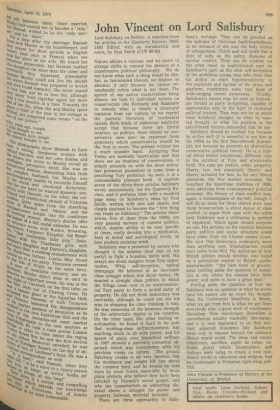John Vincent on Lord Salisbury
Lord Salisbury on Politics: A selection from his articles in the Quarterly Review, 18601883 Edited, with an introduction and notes, by Paul Smith (CUP £6.80) Nature abhors a vacuum; and we resort to strange shifts to conceal the absence of a conservative political philosophy. We do not know what such a thing would be like, but, as fair-minded liberals, we deplore its absence, if only because we cannot triumphantly refute what is not there. The speech of our native conservatism being silence, we look to individual writers on conservatism like Kedourie and Szamuely to remedy what is clearly a structural omission from our culture, or we reprint the patristic literature of continental racism. Both kinds of endeavour implicitly accept that because there are liberal treatises on politics, there should be conservative ones also: an argument from symmetry which conservatives should be the first to scorn. The present volume has a much sounder basis. Accepting that Tories are normally 'inarticulate and that there are no treatises of conservatism, it simply presents us with the most articulate polemical journalism to come from a practising Tory politician. As such, it is a commendably pleasant book. It reprints seven of the thirty-three articles Salisbury wrote, anonymously, for the Quarterly Review, and it prefaces them with a hundred page essay on Salisbury's ideas by Paul Smith, written with zest and charm, and clearly destined to become the "first thing one reads on Salisbury." The articles themselves, five of them from the 1860s, are very general surveys of current politics, which, despite ability to be very specific at times, really develop into a meditation, both at moral and sociological levels, on how modern societies work.
Salisbury was a pessimist by nature who thought it his mission (and that of his party) to fight a hopeless battle well. His essays are about dangers: from Tory opportunism, Whig self-deception, radical demagogy. He believed in an inevitable class struggle which was about money. He wanted a straight class politics in which the Whigs came over to an unreconstructed Tory party to form a united party of property. He did not think democracy was inevitable, although he could not see his way to stopping his class thinking it was. He was conscious of the immense strength of the aristocratic regime in the counties. On the other hand, like other leading reactionaries, he found it hard to be sure that working-class enfranchisement had anything much to do with power, and his spasm of panic over household suffrage in 1867 showed a narrowly numerical approach which was inconsistent with his previous views on reform. The ground Salisbury covers is all very familiar, but his mordancy and insight lift him above the common herd, and he should be read more by more Tories, especially by those pious prefects who believe they have been infected by Disraeli's social gospel, and who see conservatism as something elevated above a struggle for power and property between material interests. There are three approaches to Salis bury's writings. They can be greeted as the epitome of Christian hard-headedness, as an instance of the way the holy trinity of unhappiness, Christ and toil work like a dose of salts on the paltry illusions of secular conflict. They can be treated, on the other hand, as sophisticated cant on Salisbury's part: as the slick self-deception of the ambitious young man who feels that his ability to react hypersensitively to the sophistry and egoism of the press and platform, constitutes some rare kind of wide-ranging moral awareness. Thirdly, Salisbury's essays may be seen as immediate thrusts in party in-fighting, capable of appreciation only in the light of technical political history. They may not be so much what Salisbury thought, as what he wanted thought, or what his position in the anti-Disraeli faction demanded that he say.
Salisbury should be studied: but because he writes well (it is essential to see him in the 1860s as the first Beaverbrook journalist), not because he presents an alternative conservative political theory. He is a typical elitist liberal intellectual, different only in the accident of Tory and aristocratic birth. His ends are justice, order, property, liberty, law, but essentially liberty: and liberty included for him, as for any liberal philistine, the free market economy. He breathed the bipartisan tradition of 1688, with additions from contemporary political economy. His theory of class conflict was, again, a commonplace of the left: though it will do no harm for those church mice who think conservatism is about denial of class conflict, to argue their case with the noble lord. Salisbury was a utilitarian in method of argument, which again should surprise no one. His articles on the relation between party politics and social structure could have come from his Liberal enemy Lowe. His view that democracy endangers, more than anything else, libertarianism, could have come from Mill. His definition of how British politics should develop, was based on a perception central to British parliamentarianism: "the best form of government (setting aside the question of morality) is one where the masses have little power, and seem to have a great deal." Putting aside the question of how far Salisbury was an operator in what he wrote (and his essays are no more his thought than the Communist Manifesto is Marx), what we get from him is what we get from everybody else: a good swill of reactionary liberalism. Now reactionary liberalism is nevertheless usually markedly libertarian: and it is very important to us that brilliant apparent dissidents like Salisbury went only in manner beyond the ordinary liberal moral world. The ideas and values (obedience, sacrifice, esprit de corps, national glory) which headmasters and bishops were using to create a new nonliberal world in education and religion, had no counterpart in Victorian right-wing politics.
John Vincent is Professor of History at the University of Bristol.


































 Previous page
Previous page